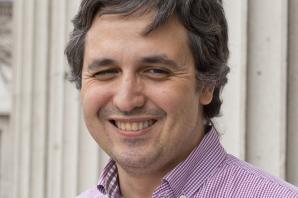
In SKILLPOV, Carneiro and his team are exploring several trajectories of human capital formation in impoverished communities. One such setting is Macedonia, where in 2008 the World Bank was about to start a cash-transfer program for the poor. “They were unsure about how to implement it so they tested a few options. In one of them, they decided to pay the cash to the mother, as opposed to giving it to the head of the household, which usually is the father.”
“I was interested in trying to understand what goes on in the family when such an intervention happens and how this affects the parents’ investment in their children”, Carneiro explains. “Families are complex; the two decision-makers, the father and the mother, do not always agree. Especially in poor countries, when the male is dominating the allocation of expenditure, perhaps they spend more on certain consumption items and not so much on the children. “
Carneiro sought to understand whether the bargaining power of women who received the cash had increased. The study also examined whether the women invested more in their children. Carneiro: “Even though these are longstanding questions, they are difficult to answer conclusively due to the rarity of large-scale policy trials. Surprisingly, the results of our study showed a smaller impact than anticipated.”
Lower path
Another SKILLLPOV study looks at the impact of teachers on the learning process of primary school children, using innovative survey tools to estimate their contribution. “Some kids are really unlucky and have poor teachers or rowdy classmates in the first grades”, says Carneiro. “Starting at such a lower path may create a significant delay in academic progress. The key question is whether this delay is permanent or if a competent teacher in a later grade can compensate for it.”
Carneiro explains that the Inter-American Development Bank expressed interested in the topic, and they collaborated to analyse longitudinal data from Ecuador. The data tracked the progress of children as they advanced through primary school, and examined the impact of having both more competent and less competent teachers on their learning.
"The findings were unexpected”, Carneiro says. “Despite my initial assumption of a significant dependency on previous learning experiences, most children successfully overcame early learning delays caused by a lower quality teacher, if assigned a good teacher in later grades. This insight highlights the intricacies of skill development. It appears that at a young age, there exists a considerable potential for a successful intervention."
In the development of human capital, each newly acquired skill is built upon previous ones. “This natural learning process implies that without a strong foundation to build upon, it may become more difficult to address skill deficiencies in the future”, says Carneiro. “Anti-poverty policies that only intervene during adulthood are generally not very effective, except in extreme cases, such as in poor countries when substantial resources are provided. Typically, welfare policies aim to alleviate poverty in the short term by improving living conditions, but they do not ultimately eradicate poverty by helping people secure better jobs.”
Flexibility to adapt
The European Union recently declared 2023 the European Year of Skills, a campaign to enhance the skillset of the population and to answer to new skills demands in Europe created by the green and digital transitions. “The modern economy is very much a knowledge economy. It is not manufacturing as it was 50 years ago”, Carneiro explains. “You need skills and flexibility to adapt, and that only comes with human capital. Even assembly lines are nowadays technologically advanced, and difficult to understand if you lack skills, even for young people.
“Consequently, people from poor families, especially those with few skills, seem to have a lot of trouble with getting out of there”, Carneiro continues. “A big chunk of the European population – 20 to 25 percent – is being left behind. Even in Nordic countries, social mobility is not improving. Perhaps those countries have taxes that are more progressive so they are able to have stronger welfare states. But people from lower educational backgrounds do not do so well on the labour market there either.”
Carneiro suggests that while initiatives like the European Year of Skills are a positive step, a longer-term approach is necessary. He emphasizes the importance of investing in skills from early stages of life, implying that understanding the family dynamics and circumstances of disadvantaged children during their upbringing is crucial.
“The main predictor of how successful you will be in terms of skills is your family”, he says. “Of course, educational institutions such as schools play a role, but the biggest influence by far is your family. We have to understand better how family dynamics affect the accumulation of skills from the early stages of life, because that is going to translate into who you are for the rest of your life. It is really going to leave a mark; we see that in the data. “
Increasing wages
With this in mind, Carneiro intends to build on the work of team member Lindner, who studied the significant and enduring increase in Hungary's minimum wage, and its incidence on individuals and firms. “I am from Portugal, and how we set the minimum wage is always a point of discussion. That counts for many European countries too, and it is certainly a big debate in the US. The concern is that increasing the minimum wage could potentially reduce employment opportunities for the poor. This is because an excessively high minimum wage may impose constraints, causing employers to be less willing to hire as many individuals as they become more expensive to employ.”
“In Hungary, there was a massive increase in minimum wage but, surprisingly, there were very little disemployment effects. Employers made adjustments in other areas, including raising prices and altering their investments. A next step is to see what impact there is on the children of the workers whose wages went up, and how it changes their future. Governments are increasingly making detailed administrative records accessible to researchers. Through these large datasets we are able to study the impact of major policies and track changes over time.”
Developing concrete evidence of a policy's long-term impact can be a challenge, says Carneiro. “Trying to convince anyone that a policy or set of policies is solely responsible for an impact that takes twenty years to materialise is something that you cannot do easily.”
“We have to put the evidence together with theory and make a convincing argument to challenge the short run horizon of many politicians. They often prioritise pursuing short-term gains to appease voters, and not something that will pay off only in 30 years. Similarly, poorer parents might not realise what the important policies are that should be in place for the future of their children. They do not have the right information or they live in difficult circumstances and are worried about their day-to-day survival. So there is a convolution of two problems.”
Biography
Pedro Carneiro is a Professor of Economics at University College London, a Research Fellow at the Institute for Fiscal Studies, and an economist in the Centre for Microdata Methods and Practice. His research interests include development economics, labour economics, the economics of education and micro econometrics. In the past, he has examined issues such as the returns to education, human capital policy, and labour regulation in developing countries. He has studied poverty and education programs in several countries in Latin America, Africa and Eastern Europe.



